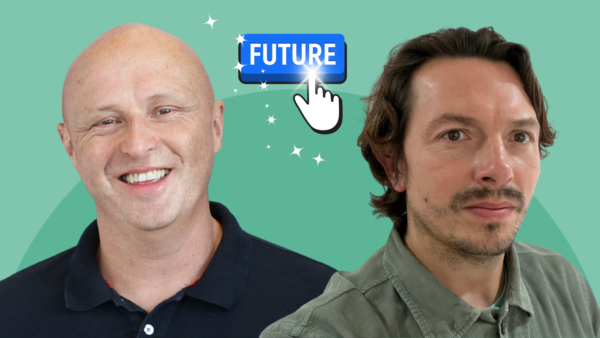Introduction – so many career myths still to debunk
There’s a lot of old ways of thinking about careers still kicking about in what you might have assumed would be a more enlightened time. So this podcast is designed to help debunk some of those career myths and help you build a career that’s more you-shaped, based on your strengths. My five myths are:
- Work is meant to be tough, choosing a strengths-based career seems indulgent
- All careers and roles will give me the same opportunity to use my strengths anyway, right?
- Other people will see my strengths and find the right role for me
- I should focus on removing my weaknesses and making myself an all-rounder
- My role doesn’t really play to my strengths but there’s not much I can do about it
Here we go…
Myth 1
Work is supposed to be tough so choosing a strengths-based career seems indulgent
We live in a world awash with negativity bias. What’s negativity bias? It’s our human tendency to be super vigilant when it comes to negative stimuli. Presumably at one point way way back, this was advantageous to us, as in riskier times we might have been attacked by animals or neighbouring tribes if we weren’t on the lookout 24-7, but it’s still there, large as life, in each of us, even though imminent risk of death from our surroundings is long gone, for most of us anyway. What’s the significance of this? Well we get programmed to pay more attention to the negative from an early age and that can lead to us developing negative perceptions and expectations, around school, then work, and then careers. Plus we’re affected by the views of previous generations which get passed down to us through story-telling and example-sharing. And the generation before us and the generation before that had even more negative experiences of the world, so that then becomes our truth, before we’ve even had a chance to make our own minds up.
When it comes to work and careers, then, this negativity bias can actually lead us towards a tougher path than is necessary because we have come to believe that life is hard, and that work is supposed to be tough and that therefore seeking career choices that let us pay to our strengths more of the time is simply a frivolous indulgence that avoids the reality that we just need to knuckle down and get on with work, even if it sucks. Firstly, there’s actually nothing easy or indulgent about picking a career track that plays to our strengths. If anything, that’s a more challenging route than just putting up and shutting up because we need to own the things that energise us and that could mark us out as positively different. The second point here is that people who play to their strengths report higher levels of well-being, self-confidence, job satisfaction and ultimately greater career success than people who don’t play to strengths. So we really should be considering how to make our careers more strengths-based.
In summary, finding a career where you can play to your strengths, while it might feel like more of a natural fit, is not an easy path, but is likely to be a more energising, fulfilling, enjoyable one.
Myth 2
All careers and roles will give me the same opportunity to use my strengths
Wouldn’t it be lovely if this were true, and it is true that you can always re-purpose your role to be more strengths-shaped (more on that later), but the reality is that some career choices will offer up more opportunity to use your strengths than others. We did a piece of research a while back on medics in early careers at the point that they needed to make choices on specialisation. Should they become research scientists, GPs, hospital doctors, psychiatrists or surgeons? While each of these specialisms (and the fifty or so others that early career doctors can choose from) overlap to some extent, there will inevitably be differences in the opportunity to use certain strengths. For example, a predominance of thinking strengths may find greater opportunity to be stretched in a research speciality, whereas more relational strengths may be better suited to something more public-facing like a GP or hospital doctor specialty. So when looking at different careers…or more importantly different specialisms or disciplines within a particular career path…ask yourself how much opportunity there will be for you to stretch those natural energisers – the strengths – that you bring.
Myth 3
Other people will see my strengths and find the right role for me
There is an age-old belief, still it seems very much around today, that there is a careers-fairy somewhere taking care of everyone’s career and making sure that they end up on the right track. Or at least that must be the belief because I see evidence of it all too often in the work I do on careers in organisations – so many people sit back and just let their careers happen to them. Some get lucky and will have sponsors or champions who can see their potential and have the visibility of opportunity and level of influence needed to guide them onto an appropriate path. But that’s a small minority, compared to most people who don’t have that luxury. For the great majority, it’s vital that you: 1. Communicate clearly about the benefits you can bring to a role or team or department by getting good at describing your strengths and 2. See yourself as the person who has greatest interest in, and control over, your career choices. Don’t wait for others to spot your potential or you may end up on the wrong track or being passed over entirely. Take control of your career – it’s yours, no one else’s.
Myth 4
I should focus on removing my weaknesses and making myself an all-rounder
I think this myth has come from a decades-long focus on competencies as a main method of performance managing people in organisations. The idea is that you need to demonstrate an acceptable level of competence across a wide range of behaviours in order to be seen as suitable for a particular role or promotion. And this has led to people trying to fit into templated career structures that don’t allow them to be their authentic, spiky selves, but instead allows them only to be a diluted version of all they can be.
The net effect of this is that people have continued to focus on reducing their weaknesses when it comes to personal development in order to meet competency standards. That is, they’ve been trying to get good at stuff that they’re not naturally good at and that takes effort and motivation to do, which over time, can diminish, just like the returns on all that effort do. So ask yourself whether all weaknesses and shortcomings are equal or whether there is a different way to work on those things that just don’t float your boat? For example, can you work with others to get the same result? Or use the strengths you do have to meet the standard? Coz no matter how much you polish a turd, it’s still going to be a turd, just a slightly smarter looking one.
Myth 5
My role doesn’t really play to my strengths but there’s not much I can do about it
Last myth: I mentioned earlier that its not true that all career choices give you equal opportunity to use your strengths. That’s definitely the case BUT it’s also true that there’s almost always more opportunity to use your strengths in your current context if you’re creative in your thinking. So in your current role, look around for new opportunities…within your role remit, but also look for any special projects or team-based work that will give you more of an opportunity to put your strengths to use. And talk to your line manager, ask whether there are any ways they can see that you might be able to use your strengths more in your current role. Talking to your line manager has the added benefit of getting your strengths more visible to your manager and getting them looking for new opportunities on your behalf, particularly helpful as new roles come up where your strengths may be an even better fit.
In conclusion – how to nudge your career towards strengths
That’s it, five career myths challenged and debunked, and with each, a strengths-based antidote provided. I wish you the best in nudging your career in more of a strengths direction. Till next time, stay strong.












